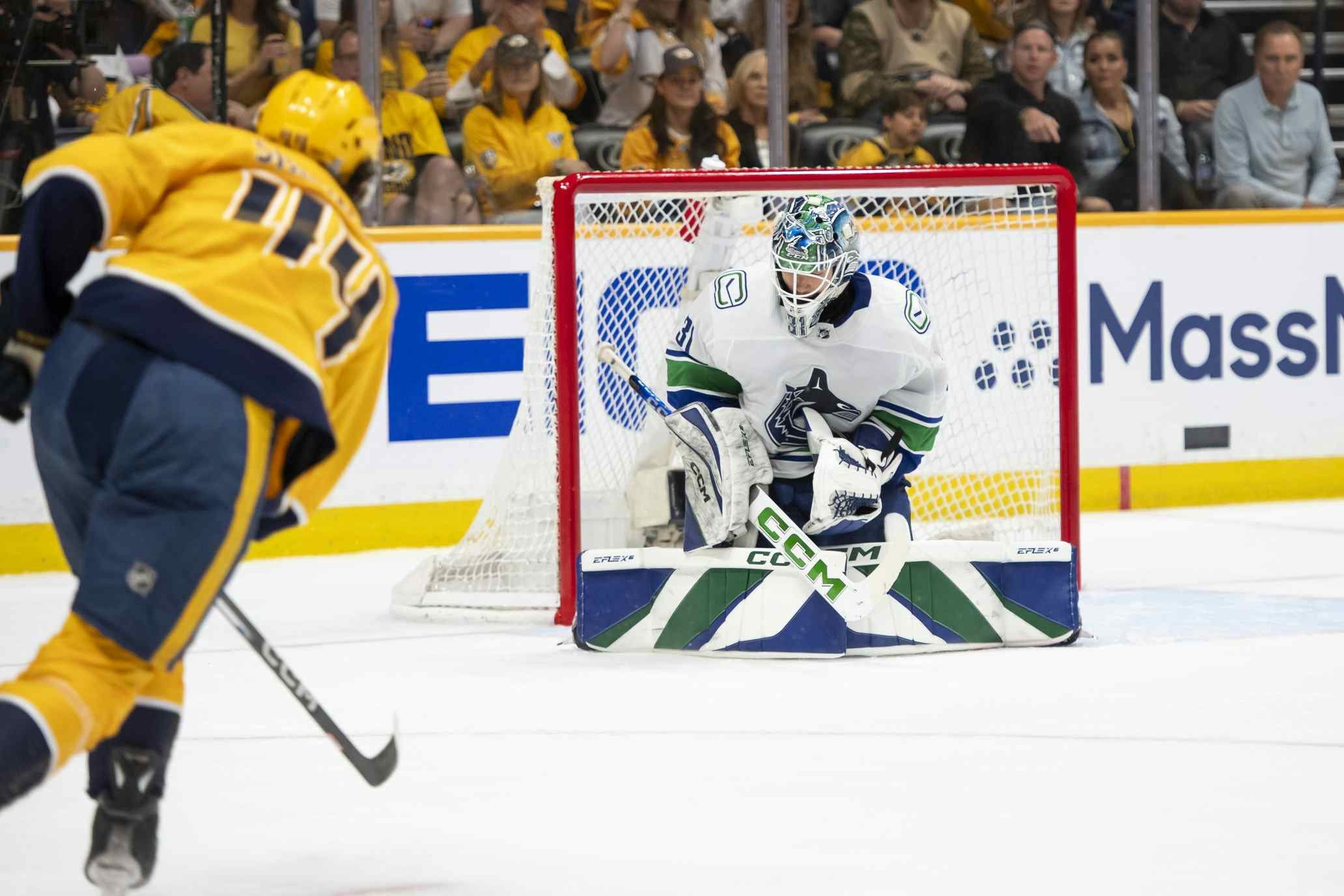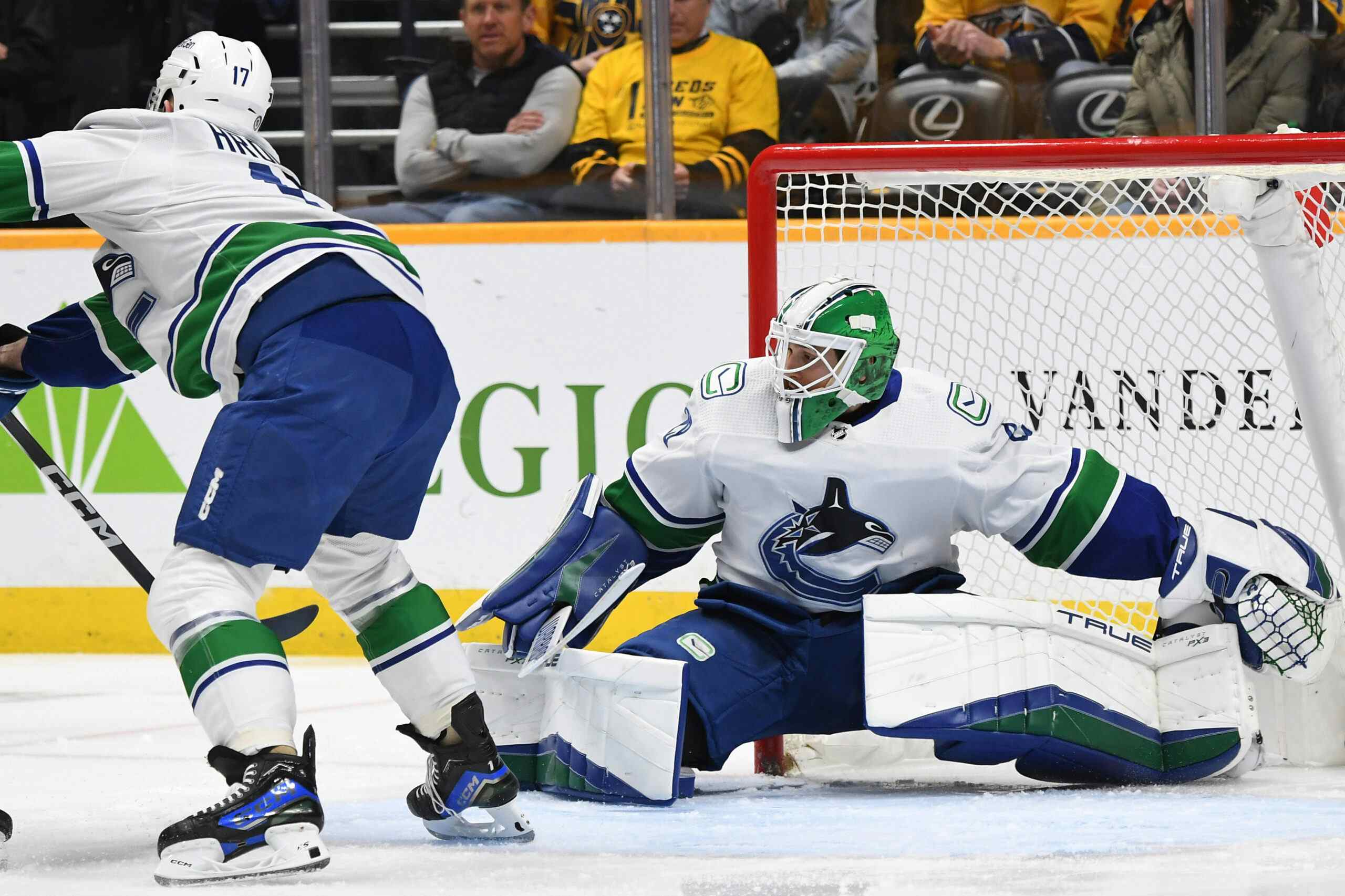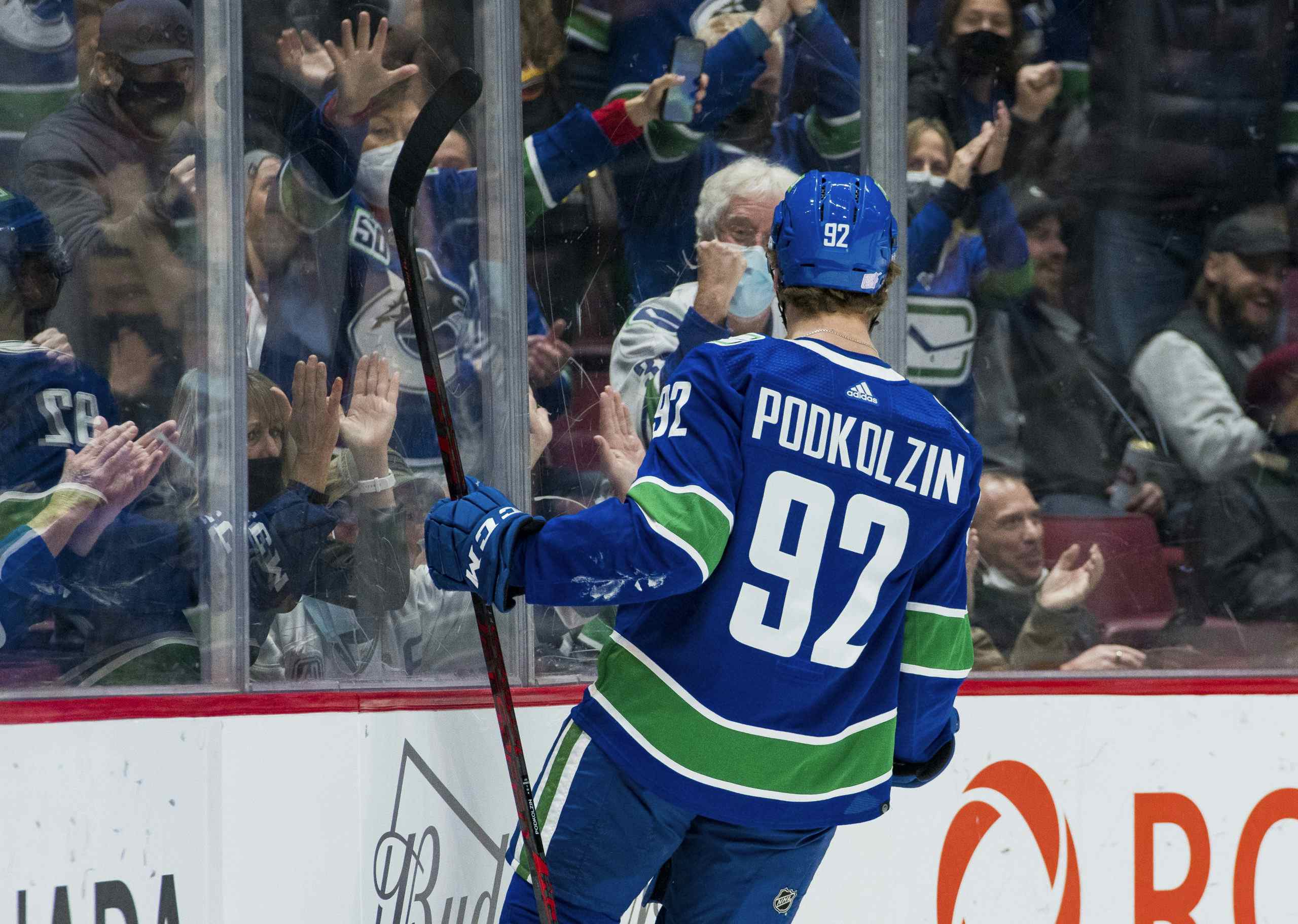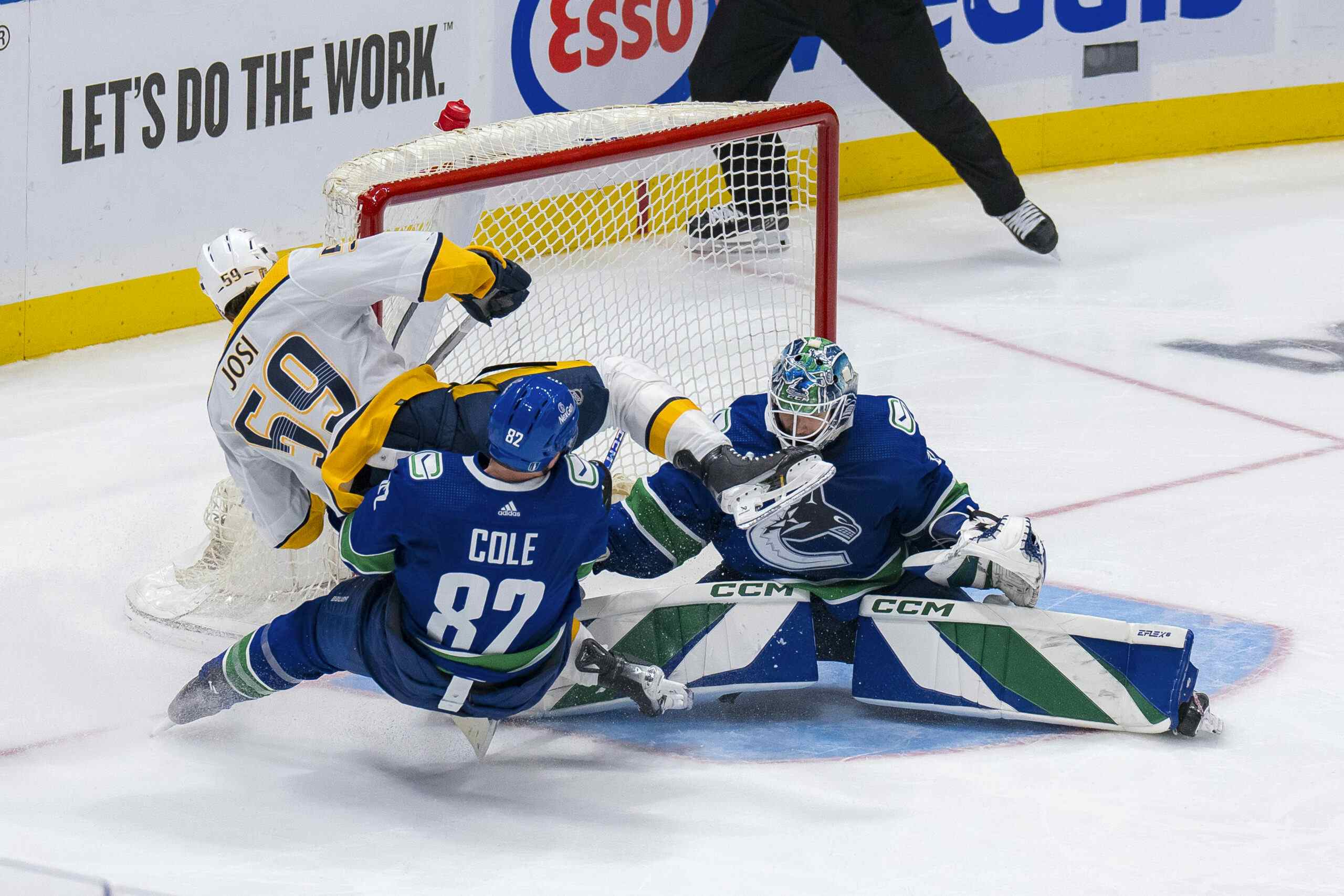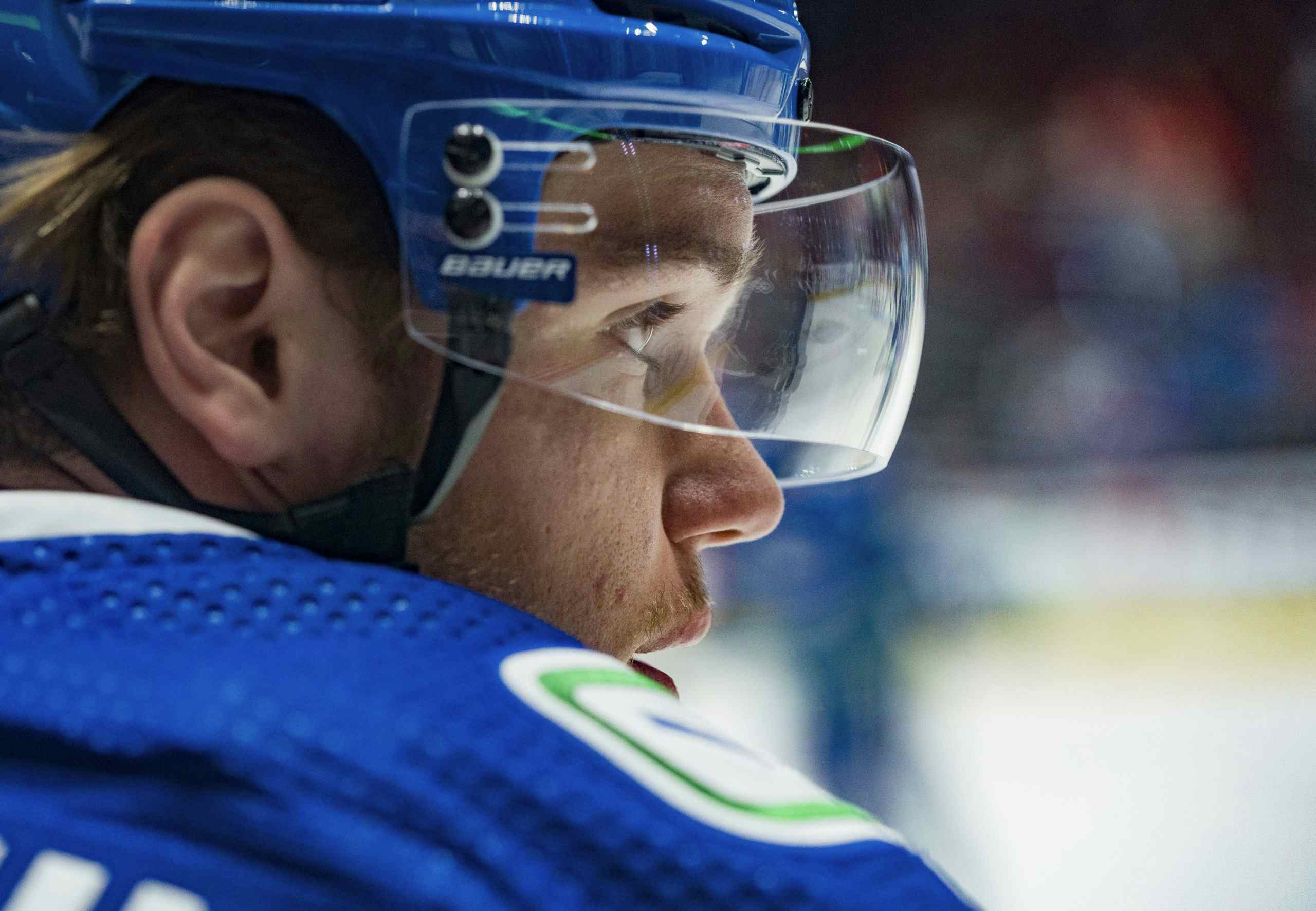Four Last Minute Trade Proposals To Upgrade Troy Stecher Before The Deadline
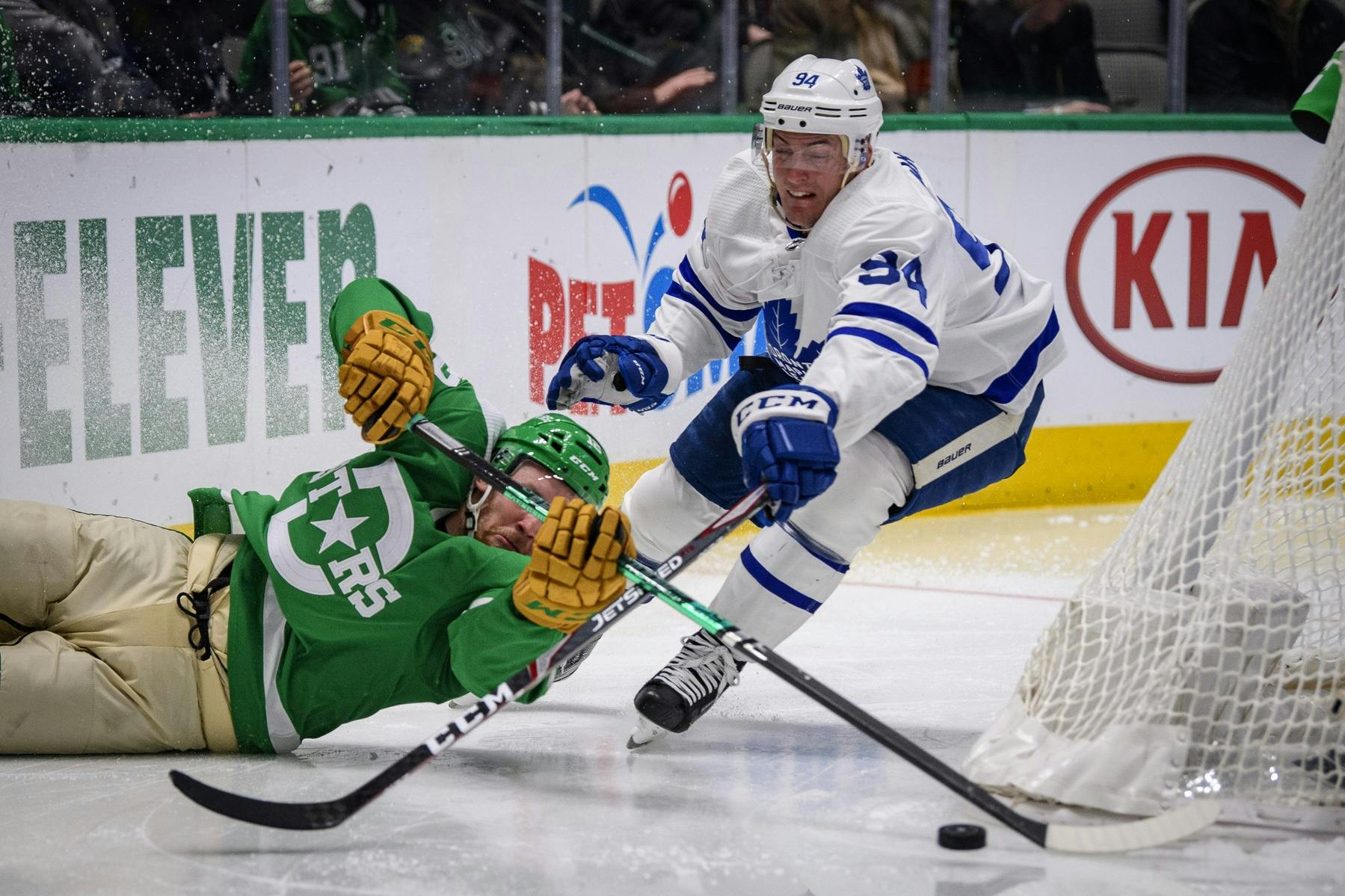
Just a few dozen hours before the 2020 NHL Trade Deadline, the Vancouver Canucks find themselves in an interesting position. They’ve already closed down one big midseason acquisition in Tyler Toffoli, a move that seemed to signal that Jim Benning and Co. are “going for it” this year.
Unfortunately, the addition of Toffoli also greatly limits the team’s cap space heading into Deadline Day, which will make it difficult to “go for it” any more than they already have. That lack of room may have already prevented a trade for New Jersey’s Wayne Simmonds – something that was celebrated by large segments of the fanbase – and it could end up hindering other potential moves.
Amidst all this, one name continues to be brought up in trade talks on an almost daily basis – Troy Stecher.
Dealing Stecher at the Trade Deadline might seem like a foregone conclusion to those who worship the TSN Trade Bait List, but it’s a significantly more complicated proposal than most realize. Given the current state of the market, the Canucks could probably cash in on Stecher for something like a second round draft pick – but they almost certainly won’t.
As a team with playoff aspirations in 2020, Vancouver simply cannot afford to give Stecher up without also acquiring an equivalent replacement defender – or better yet, an upgrade. Brogan Rafferty might be the heir-apparent to Stecher’s spot in 2020/21, but shortening one’s own blueline depth heading into an important stretch run – and then counting on an untested rookie in the Stanley Cup Playoffs – is a recipe for disaster.
And because of those aforementioned cap constraints, and the fact that they could be further complicated by an earlier-than-expected Brock Boeser return, it’s not quite so simple as identifying an available upgrade on Stecher and performing a swap.
If such a move is going to be made, it’s going to have to be navigated carefully – and if we’re going to idly speculate on such a move, we’re going to need some navigational tools.
For that, we turn to our partners at PuckPedia and their recently-launched myPuckPedia GM Mode app.
Last time we played around with the app, CanucksArmy presented a proposal that involved both Stecher and a potential upgrade for him in New York’s Scott Mayfield. And while we still think Mayfield would be a worthy Deadline Day target, we don’t want to be accused of self-plagiarism, we’re going to take this round of potential deal-making in a different direction.
Identifying Available Upgrades For Troy Stecher
Before we go trading for an upgrade on Troy Stecher, we’re going to have to pick a couple of them out of the crowd. We’re hunting for right-handed defensemen – or at least those who prefer the right side – that are both on the trade block and clearly as good or better than Stecher. They either have to have a cap hit that the Canucks can manage or come from an organization willing to take a cap dump. And if their contract extends beyond the 2019/20 season, they’ll have to be signed at a bargain price – ideally, less than Stecher is currently making at $2.325 million.
That should narrow it down quite a bit – and, again, we’d be remiss if we didn’t mention that the PuckPedia main site is also an excellent resource for things like depth charts and cap structures.
Here’s what we came up with:
Ron Hainsey, Ottawa Senators
LHD, 38
| Games | Goals | Assists | Points | Corsi% | Cap Hit | Years Left | |
| 2019/20 | 54 | 1 | 10 | 11 | 45.3% | $3.5 mil | 0 (UFA) |
Hainsey is a defenceman with a lot of experience – perhaps too much of it at 38 years old. He’s been a top-pairing defenseman for the last few seasons, albeit on some awful bluelines in Toronto and Ottawa. He’s left-handed, but he typically plays on the right side. For this season and this season alone, Hainsey is probably still a slight upgrade on Troy Stecher, and that’s all he’s signed for. With Stecher out and Micheal Ferland on the LTIR, Hainsey’s salary could easily be fit.
Mike Green, Detroit Red Wings
RHD, 34
| Games | Goals | Assists | Points | Corsi% | Cap Hit | Years Left | |
| 2019/20 | 47 | 3 | 7 | 10 | 46.1% | $5.375 mil | 0 (UFA) |
Green just ain’t what he used to be. In the midst of the worst season in his NHL career, Green will only garner a decent return at the Trade Deadline if another team overvalues his reputation. There’s a good chance the Canucks could get him on the cheap, and he’s probably still at least as good an option as Stecher – with his horrible season at least partially the fault of the team around him. Stecher, and then some, would have to be shipped out in order to accommodate Green’s cap hit.
Colin Miller, Buffalo Sabres
RHD, 27
| Games | Goals | Assists | Points | Corsi% | Cap Hit | Years Left | |
| 2019/20 | 44 | 1 | 10 | 11 | 48.9% | $3.875 mil | 2 |
Miller has had an odd season in Buffalo. At various points he’s been a healthy scratch and dressed as an extra forward, but now he’s playing on their top pairing after the departures of Marco Scandella and Zach Bogosian. He’s got a good enough track record that his performance this year could be considered an anomaly, but any team acquiring him would have to be certain of a bounce back – because he’s signed for two more years at a decent chunk of change.
Damon Severson, New Jersey Devils
RHD, 25
| Games | Goals | Assists | Points | Corsi% | Cap Hit | Years Left | |
| 2019/20 | 60 | 7 | 18 | 25 | 47.0% | $4.167 mil | 3 |
Severson is the probably the second-best defenseman on this list, and he’s certainly the youngest – the same age as Stecher, in fact. New Jersey might not have much of a reason to trade him, but his name has been present in rumours all season, and the Devils do seem to be looking to make a deal. Not only would he cost a lot, however, he’d also represent a long-term salary commitment – meaning the Canucks couldn’t take him without convincing the Devils to take back a significant dump.
Chad Ruhwedel, Pittsburgh Penguins
RHD, 29
| Games | Goals | Assists | Points | Corsi% | Cap Hit | Years Left | |
| 2019/20 | 36 | 2 | 4 | 6 | 49.6% | $700K | 1 (UFA) |
Ruhwedel is an interesting one. He’s been a minor cog in some fantastic Penguins teams, including the Stanley Cup winner in 2017, but he’s never managed to become an everyday player. With Pittsburgh rumoured to be adding another defender to their blueline, someone is going to have to go – and they’d obviously rather trade Ruhwedel than waive him. He might not be much, or any, of an upgrade on Stecher, but his experience alone could make him a worthwhile addition on the cheap.
Tyson Barrie, Toronto Maple Leafs
RHD, 28
| Games | Goals | Assists | Points | Corsi% | Cap Hit | Years Left | |
| 2019/20 | 62 | 5 | 28 | 33 | 54.5% | $2.75 mil | 0 (UFA) |
Of all the players on this list, Barrie is the only one to actually be linked to Vancouver in trade talks, and not just because he’s a local. Barrie’s supposedly dismal season hasn’t actually been all that bad, but his flaws have been exposed and magnified by the Toronto media – which could drive his price down. A straight-swap for Stecher works salary-wise, but not value-wise, which raises the question of just how much the Canucks would need to add for such a vast upgrade.
Making The Cap Work
We’ll start with the most complicated additions, cap-wise, and work our way down from there.
Of all the players on the list, Damon Severson is owed the most money, and is thus the most difficult to fit in. For this season and next, the Devils could lighten the Canucks’ cap load by taking on Sven Baertschi as part of the deal – but it’s past that point when Severson’s contract would really start causing problems.
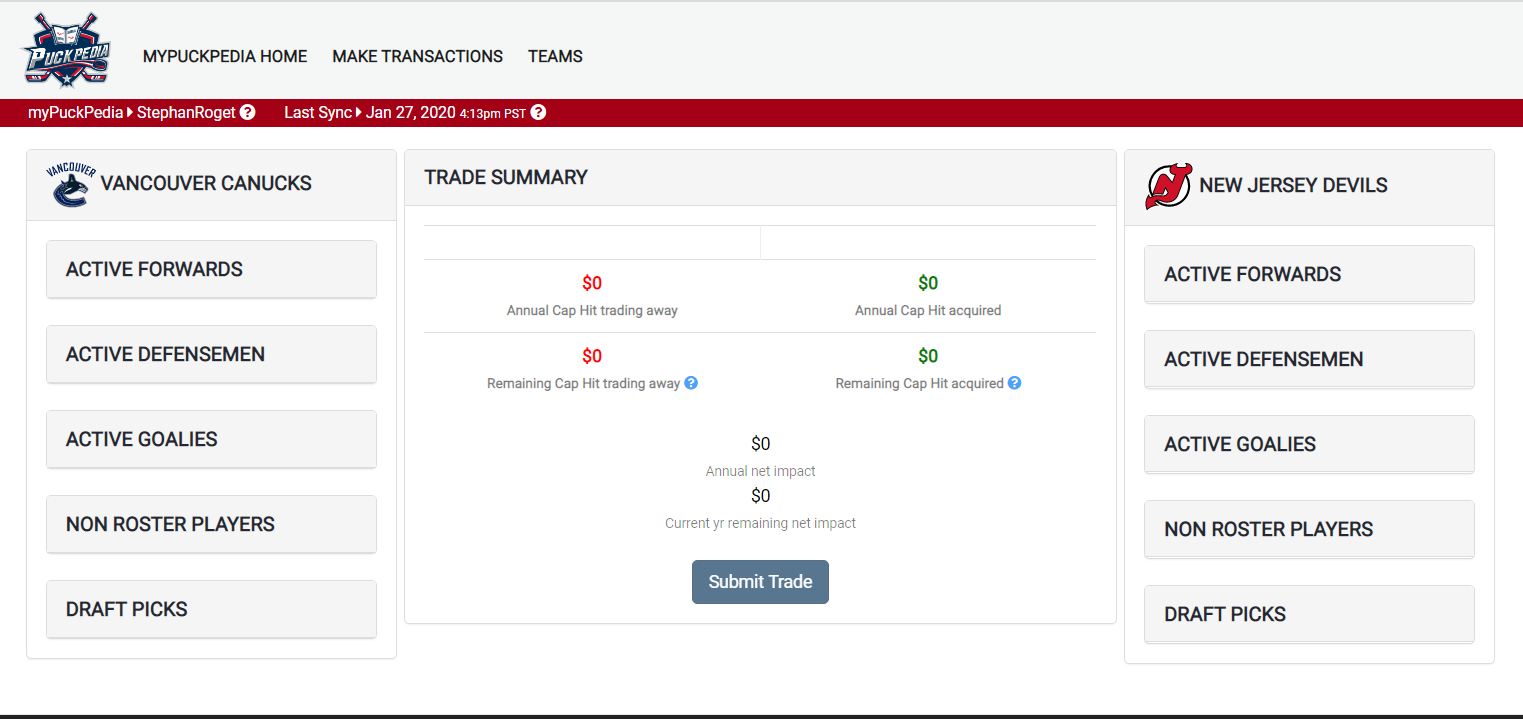
If the Canucks are going to pay another right-handed defenseman more than $4 million per season beyond 2021, it might as well be Chris Tanev – who they don’t have to give up any assets to acquire.
The same applies to Colin Miller, though he’s signed for less salary and term than Severson. Convincing Buffalo to take Baertschi helps fit Miller in this season and next, but beyond that he could be a burden – and that could hinder the all-important re-signings of Elias Pettersson and Quinn Hughes in the 2021 offseason.
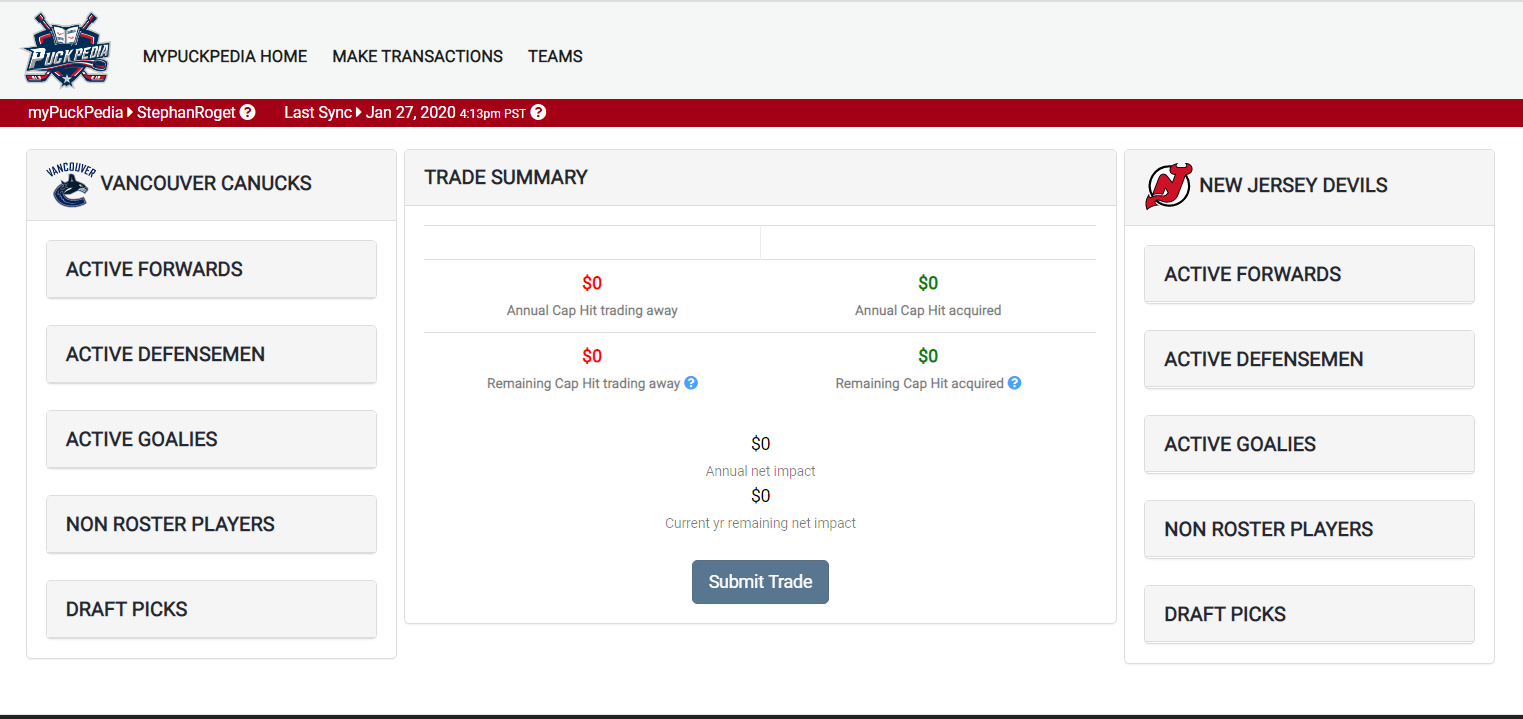
For now, we’ll have to take both Severson and Miller out of consideration.
Next up is Mike Green, who has a higher cap hit than either of those two this year, but is an unrestricted free agent as of July 1, 2020. Green’s cap hit at the Trade Deadline is reduced to just over a million, and so the Canucks could almost squeeze him in on Micheal Ferland’s LTIR space alone – and especially if Detroit took any NHL salary back at all.
The same goes for Ron Hainsey’s $3.5 million expiring contract, and you know Ottawa’s willing to take back salary.
Tyson Barrie is even easier to figure out. His half-retained cap hit is just a hair over Troy Stecher’s own. Given that the Leafs have reportedly shown some interest in Stecher, such a swap would make sense both roster- and cap-wise, though the additional cost that would come with acquiring Barrie could make all the difference. At the very least, salary wouldn’t be an issue.
Of course, it would be even less of an issue for Chad Ruhwedel and his $700K contract. With his near-minimum cap hit, any team in the league could add Ruhwedel to their roster without having to worry about salary space.
Balancing The Scales Of Value
With three defencemen left on our list, we’ve got three very different trades to work out.
The Detroit Red Wings don’t have a lot of blueliners signed beyond this season, so they might just be interested in Troy Stecher as part of a swap for Mike Green. In fact, Stecher alone might nearly get the deal done – though Detroit would probably insist on a futures-based asset to compensate for Green’s greater reputation. Let’s call it a 4th round pick or a minor-tier prospect like Josh Teves.
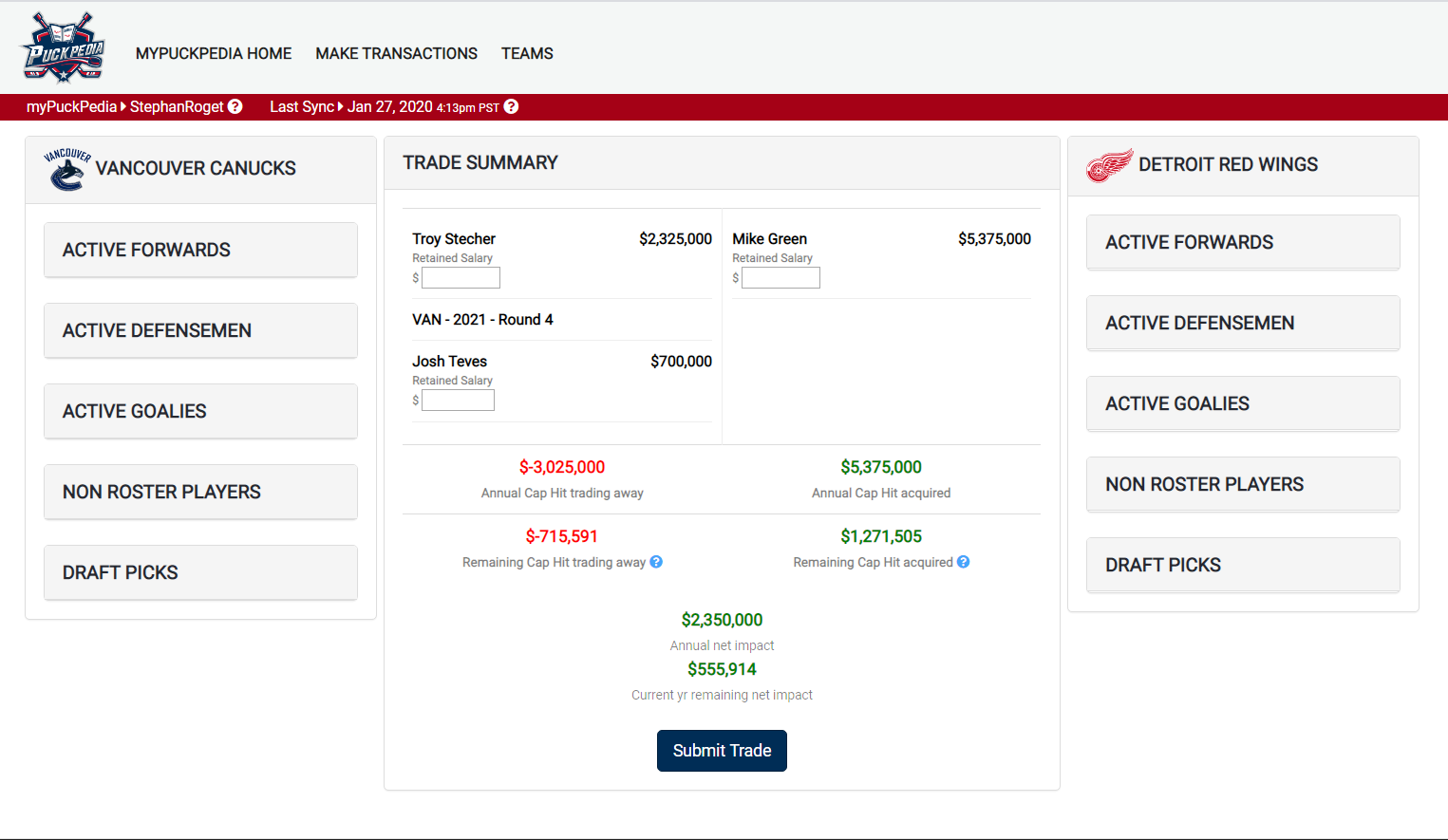
This trade works cap-wise this season, saves money next year, and provides at least a marginal upgrade on Stecher for the Canucks’ bottom-pairing – and an additional powerplay specialist, to boot. This is a nice, middle-of-the-road acquisition.
As with Green, a trade for Tyson Barrie should also center around Stecher – but this time there’s a much greater gap in value between the two players. With the market the way it is, the Leafs could easily cash in on Barrie on Deadline Day for a big package of futures, and they’re going to want at least a portion of that added to the middling value of Stecher.
We’re talking at least a second round pick – in 2021, of course – and a prospect that it would sort of hurt to lose. Perhaps a Jonah Gadjovich-type.
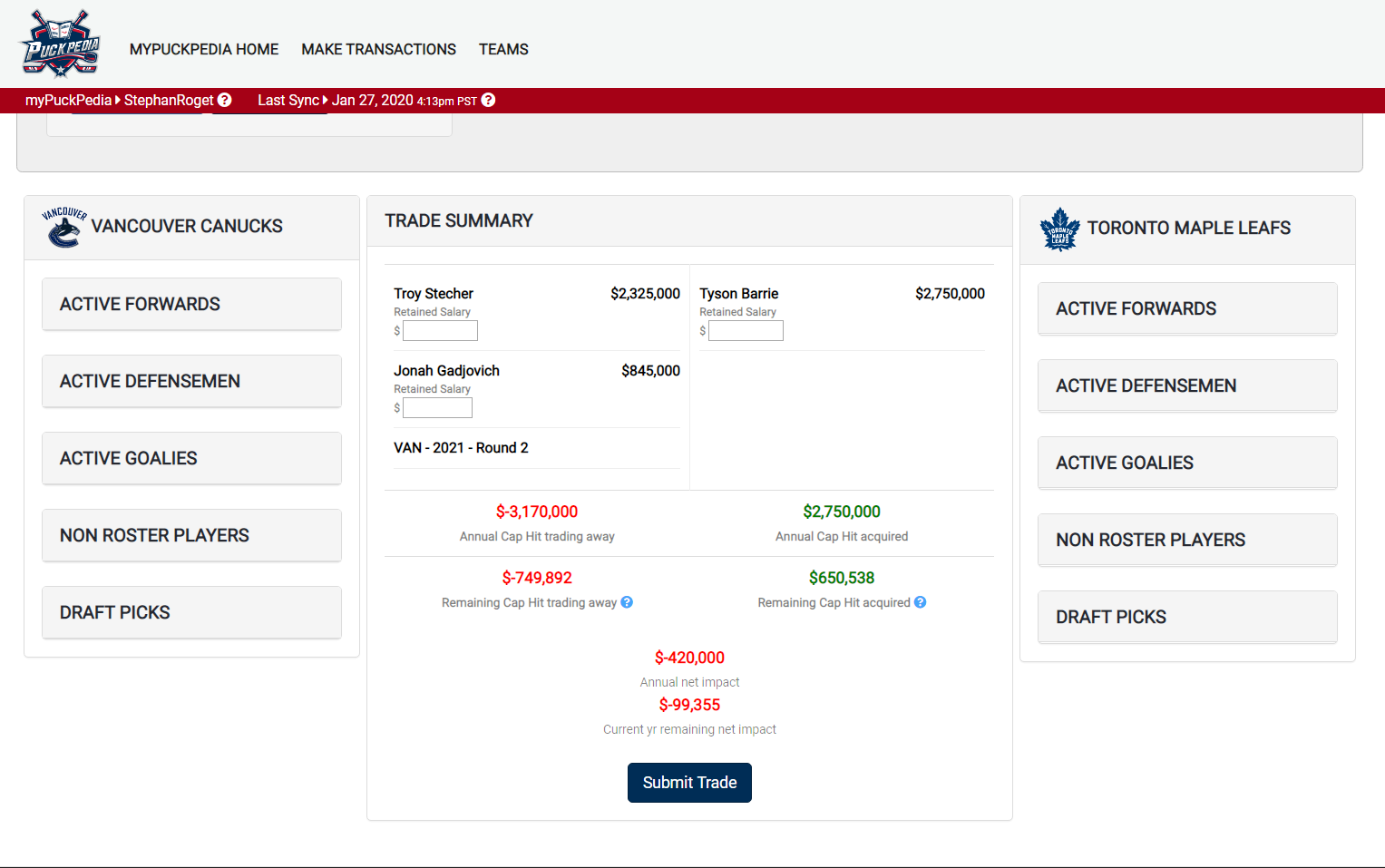
This trade also works cap-wise and saves money beyond this season – unless, of course, the Canucks choose to re-sign Barrie, in which case they wouldn’t be bringing back Chris Tanev. It also provides what has to be considered a massive upgrade on Stecher, and a player that very well could be the best defender on the Canucks’ right side. If Toronto has truly soured on Barrie and really does have an interest in Stecher, Vancouver would do well to secure a deal that looked something like this – even if it is the premium option.
With a real dearth of right-handed defenders in the organization, the Ottawa Senators would probably also have interest in Stecher, especially in a swap for the expiring Ron Hainsey – heck, it might even be the Sens adding in that scenario. If the Canucks could manage to offload someone like Sven Baertschi in the deal, however, for a small addition like a future third round pick, it could be a wise move.
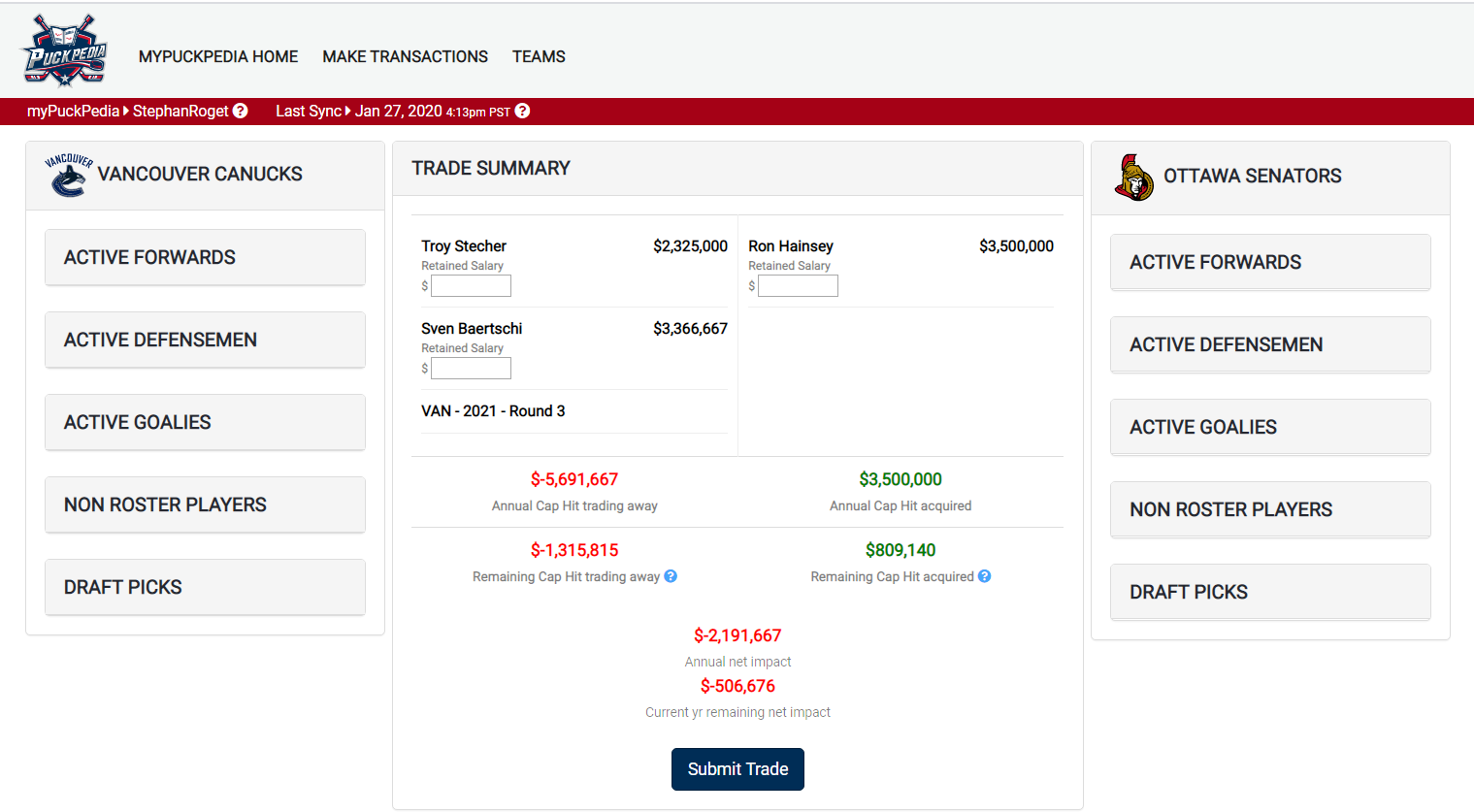
This trade works cap-wise and has no implications beyond this year with Hainsey highly unlikely to re-sign. As was mentioned before, Hainsey looks like a sure-fire upgrade on Stecher for the rest of this season at least – and that’s all the Canucks need out of him. This would be a budget-conscious move.
Finally, we come to Chad Ruhwedel – best described as the backup option. The Pittsburgh Penguins would have next-to-no interest in Troy Stecher, but that’s okay, because Ruhwedel could very well be acquired as a depth defender even with Stecher still on the roster.
More likely, the Canucks could trade Stecher for a draft pick or prospect and then flip a lesser package for Ruhwedel as a bottom-pairing replacement that might just be an upgrade. He’ll come pretty cheap, too, as the Penguins might be forced to waive him otherwise if their blueline ever returned to full health.
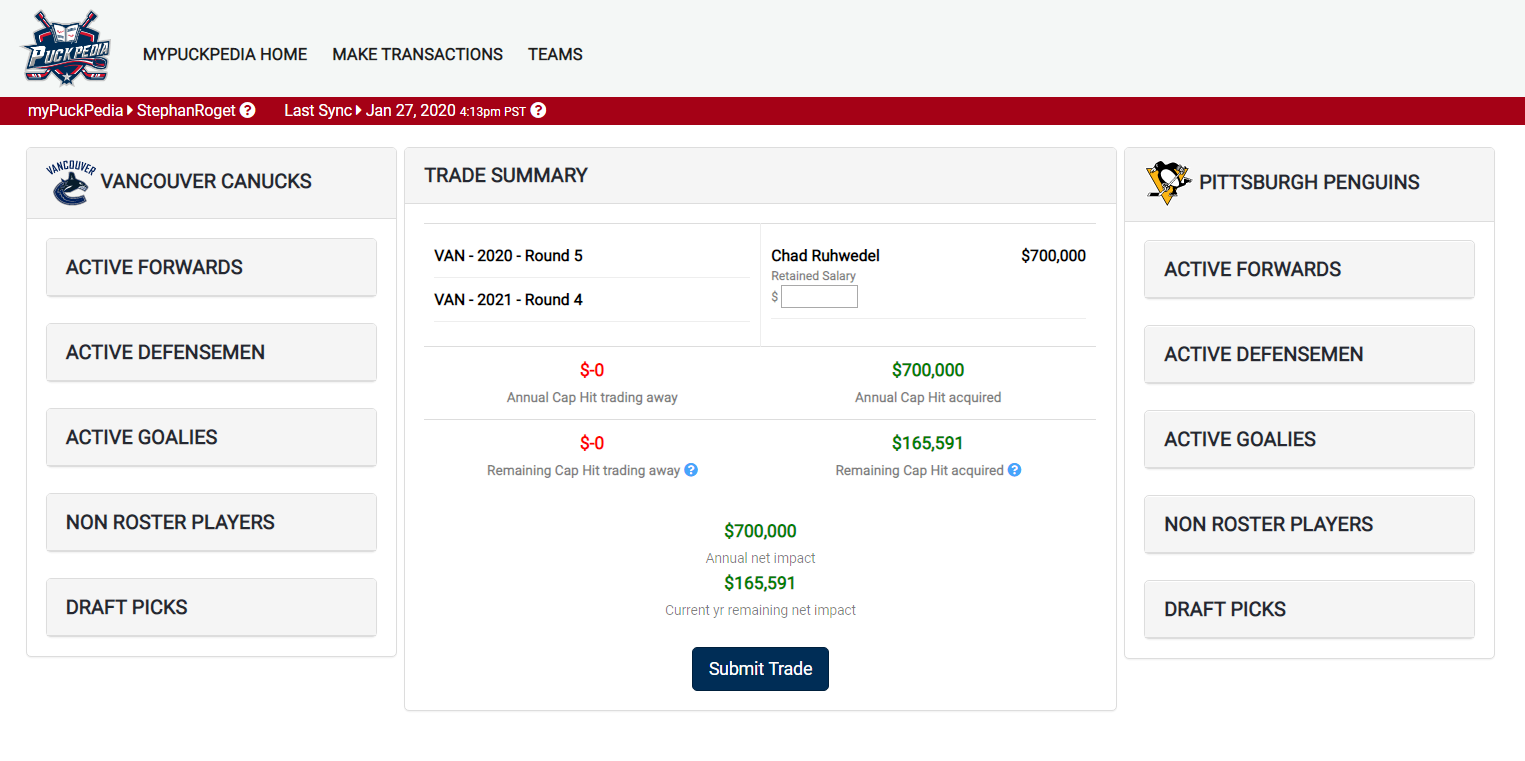
The trade obviously works cap-wise and has no impact beyond this season. Whether or not it represents an upgrade on Stecher is up for debate, but it certainly adds experience and a playoff-proven player. This would be a bargain bin sort of a deal, and more of a replacement option than a true addition.
Final Answers
With that, we’re left with four last minute Trade Deadline proposals to choose from:
To Vancouver:
Mike Green
To Detroit:
Troy Stecher
2021 4th Round Pick/Josh Teves
Or
To Vancouver:
Tyson Barrie
To Toronto:
Troy Stecher
2021 2nd Round Pick
Jonah Gadjovich
Or
To Vancouver:
Ron Hainsey
To Ottawa:
Troy Stecher
Sven Baertschi
2021 3rd Round Pick
Or
To Vancouver:
Chad Ruhwedel
To Pittsburgh:
2020 5th Round Pick
2021 4th Round Pick
Will Jim Benning and Co. be making one of these deals come Monday morning? Almost certainly not. But we find idly speculating to be a worthwhile endeavour all the same, and we hope you had fun playing along.
Please don’t forget to chime in with your opinions on Twitter or in the comments below, and keep it tuned to CanucksArmy on February 24 for all the Deadline Day coverage you can shake a stick at.
Recent articles from Stephan Roget

